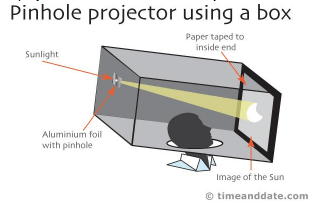Don’t Miss the Eclipse

Are you preparing for eclipse-related disasters?
Do you live in the path of the eclipse scheduled for Monday, August 21?
If so, you’d better be ready. There are some eclipse-related disasters that could happen and are likely to happen!
First, you could miss it altogether . . .
if you’re not paying attention!
What’s happening is that as the moon orbits the earth, its path will cause it to pass in front of the sun. This will create a shadow that will move across the earth — and across the face of the entire U.S., from Oregon to South Carolina. This is such a rare occurrence that it has been given a name: the Great American Eclipse — first time since 1918 that this has happened!
If you’re in the exact place where the sun, moon and earth line up, the moon/sun will look like the image above and the world around you will turn totally dark — if only for a couple of minutes.
Here’s how scientist Tyler Nordgren describes what to expect:
“The shadow of the moon moves over you, day turns to night for half an hour, the stars become visible in the middle of the day, the sun turns black and the most incredible thing – the sun’s corona: that million degree atmosphere that is invisible at all other times – suddenly you see the enormous crown, its rays of pale white spreading outward from the sun,” The Guardian
So, you don’t want to miss this one!
Action item: Here’s a super website that will tell you the time of the eclipse in your town, and show what it might look like. Just replace “city” with your city (or a nearby one) at the end of the link:
https://www.timeanddate.com/eclipse/in/usa/city
Second, looking at the eclipse could damage your eyes!
By now you should know that you should never look directly at the sun, even with dark glasses. In fact, I just today read that counterfeit solar glasses have surfaced. (Amazon is actually giving refunds for fraudulent merchandise!)
How to know whether glasses you’ve bought will do what they say? Check to be sure the glasses are from a vendor approved by the American Astronomical Society, AND make sure they have the label ISO.
 If it were me, I’d avoid glasses altogether and watch the eclipse “indirectly” using a pin-hole projector. Easy enough to make as a family project!
If it were me, I’d avoid glasses altogether and watch the eclipse “indirectly” using a pin-hole projector. Easy enough to make as a family project!
You’ll need these supplies – and you probably have everything at home already:
A cardboard box – the longer the better
Scissors and box cutter
Tape
A sheet of white paper
A square piece of aluminum foil
A pin or tack
Basic instructions:
- Cut a square hole in one end of the box, tape a slightly-larger square of tinfoil over the hole, and puncture the foil in the center with pin or tack. Make a SMALL neat round hole.
- Tape the white paper on the INSIDE of the box, at the end opposite the pin hole. This becomes the screen.
- When the eclipse starts, point the foil/pinhole end of the box at the sun. Put your head inside the box and look away from the sun at the white paper screen. There you’ll see the (reversed) projection of the sun and the shadow of the moon!
Need more? Here’s a great video demo of how to build the projector, perfect for kids. Our thanks to station WAPT in Jackson, MS: http://www.wapt.com/article/diy-make-a-box-pinhole-projector-to-view-eclipse/12014830
Third, you could find yourself trapped on the highway.
Areas that expect to be in the path of the “totality” (entire sun obscured by the moon) have been planning for months for a massive influx of visitors. I’ve been reading reports from various emergency services across the country (in particular, Idaho and Kentucky) about the steps they are taking to manage the hundreds of thousands of people they expect to try to get to “just the right spot” to view the eclipse.
Estimates of the number of people traveling to get into the path of the eclipse range from 1.85 to 7.4 million!
Police and emergency services are planning for traffic conditions replicating evacuations – that means, stop and go and maybe huge traffic jams. Even if you don’t intend to try to get to a good viewing place yourself, you may experience significant traffic congestion just trying to get to the local store.
In any case, be sure your car is full of gas and well supplied with water, emergency food and blankets, just in case you get unexpectedly caught.
As always, the more you know, the better you can anticipate potential problems and work around them.
Enjoy the eclipse!
Virginia
Your Emergency Plan Guide Team
P.S. We won’t seem much of the eclipse here in Southern California. Let us know what YOU see!
